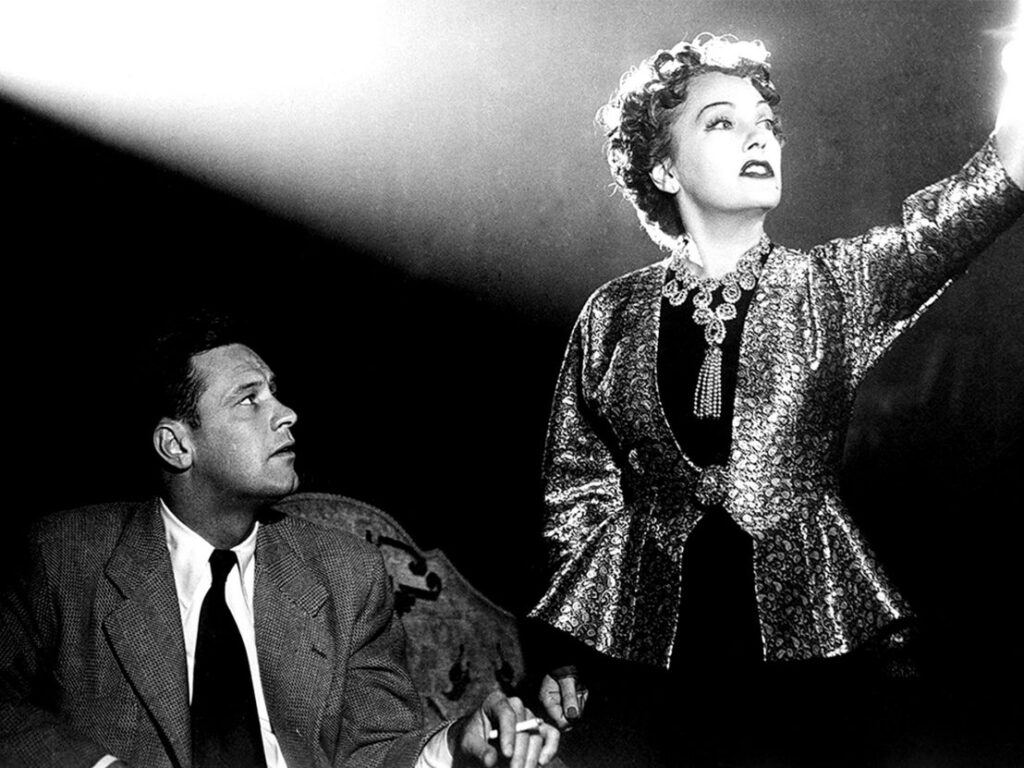
Lately, I’ve been on a David Lynch-Joni Mitchell bender. Artists seemingly opposed in every fashion, apart from a parallel trajectory into their mediums. Before either exemplified the artist in that elusive and isolated context so popular today, both were trying to establish themselves as painters — Mitchell painting landscapes and Lynch painting things I won’t even attempt to understand. The vestiges of these beginnings— texture, emotion taking precedence over everything — if not the contents themselves, are clearly discernible in their later works: Joni with her beautifully precarious voice and Lynch’s grotesquely sincere imagery. Billy Wilder, writer and director of Sunset Boulevard (1950, Screening at the Coolidge, and one of Lynch’s favorite films) did not start out doing landscapes, but originally was a painter of sorts, his canvases being the tabloid columns a hedonistic Weimar Germany made numerous.
Though you’d struggle to glean it from the shades of exuberance, Wilder harkens to this tradition in the film’s opening moments. As the dispossessed voice of Joe Gillis (William Holden) narrates the pageantry that surrounds deaths like his: “A murder has been reported in one of those great big houses in the ten-thousand block. You’ll read about it in the late editions, I’m sure.” Sunset Boulevard is kitsch elevated to cinema by virtue of Billy Wilder telling the story, but first and foremost kitsch, and every bit as regressive as its namesake promises. In the same fashion that Lynch, forty years later, would lean into the conventions of melodrama to explore the world of Twin Peaks (1990), Wilder, like a true muckraker, gawks and overstays his welcoming into these characters lives.
This intrusiveness is best displayed through the narrative’s epicenter, Norma Desmond (the lovely Gloria Swanson). The fragility that Swanson imbues within Desmond cannot be overstated. As if decades of an accumulated and impenetrable veneer are finally flaking off, but with the elegance of mascara smudged by tears. Messy, turbulent, and above all pitiful, a type of detachment that consoles itself when reminded of what it risks attaching to. She’s kin to characters like Blanche DuBois, whose delusions not only mask her irrelevance, but her womanhood as well, which is primarily what she’s trying to fortify herself against. Like her caretaker, Max (Erich von Stroheim), we can’t help but entertain her insanity, because we can’t help but feel guilty for being apart the world she’s so strongly trying to evade.
Our liaison into that world is her erstwhile lover, Joe. He acts as Wilder’s main vehicle for sardonicism, exemplifying a sort of id detached from all abstractions about itself and its screenwriting aspirations. Keen eyes will spot him brooding over the works of Norman Mailer, who, like everything else, doubles as a conduit to our world, signifying the type of sensationalism given grace by its medium. Of the irreverent truth-speaking that has allegiance to nothing before itself and that we see in the film’s detailing of the systemic seeping into the personal. The love triangle, a banality Wilder exhumes from his origins, is re-appropriated here with love serving as a placeholder for power, or if it truly exists, functioning exclusively within the context of power. Spontaneous yet conditional, constantly compromising its sanctity for the profane ideals that reigned over Hollywood, and if our current moment of strikes and protests tell us anything, that still do.
Sunset Boulevard
1950
dir. Billy Wilder
110 min.
Screens on 35mm Thursday 8/24, 7:00 p.m. at Coolidge Corner Theatre
Optional pre-show seminar by Boston Globe film critic Odie Henderson

